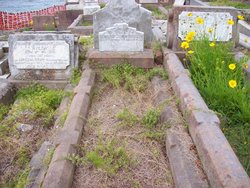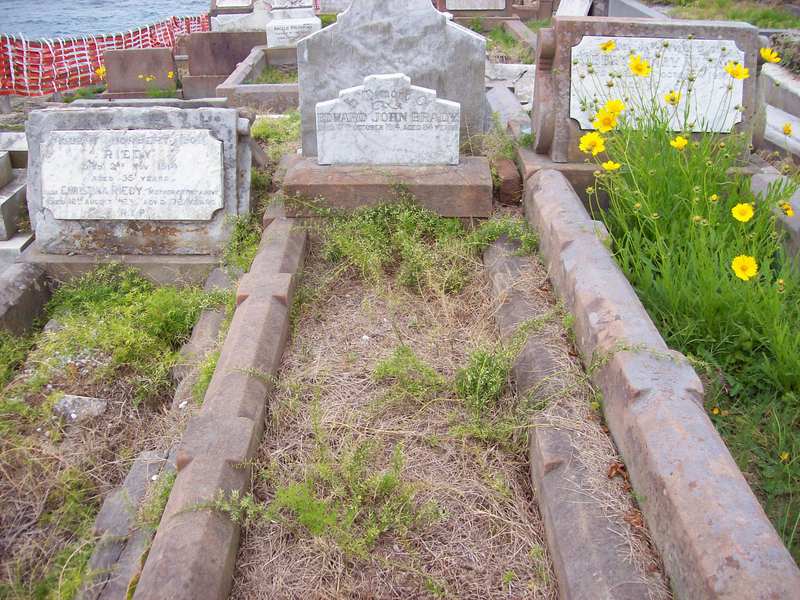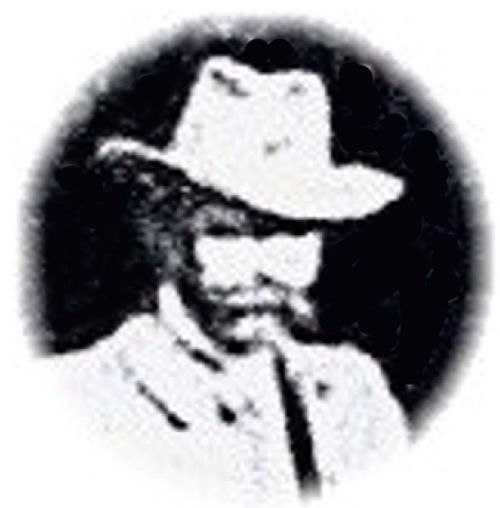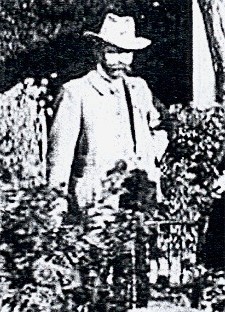On June 3, 1854, Brady was inducted into the U.S. Army, prior to the Civil War, by Lt. Winfield Hancock into Company A of the 6th. U.S. Infantry Regiment at Jefferson Barracks, twelve miles south of St. Louis; Missouri, for a period of 5 years. Later, being involved in a number of campaigns and marches in the west, Brady fought against the Native American Indians in Nebraska, in 1855, along the Platte River. In 1856 he was found in Leavenworth, Kansas, then at Tecumseh, in November 1856. The United States Army Register of Enlistments shows that Brady deserted on December 19th, 1856, and was apprehended about seven months later on July 16th, 1857. Brady was allowed to return to duty and on November 1, 1858 while hauling wagons over the Sierra Nevada Mountains, to the Benicia Barracks in California, Brady permanently injured his left leg in the line of duty; resulting in inflammation and the enlargement of the bone, leading to necrosis. Due to his injury he was awarded a disability discharge, on August 4, 1859.
Brady next boarded a whaler, the Fabius, in December 1859, eventually disembarking at Honolulu, Hawaii, where he boarded yet another ship for New Bedford, Massachusetts; arriving there in April 1861. Upon arriving and learning of a call for volunteers for the war, Brady although an invalid pensioner, enlisted as a private in New York City on April 19, 1861, into the 12th New York State Militia; for ninety days. After Brady was mustered in he was made a Corporal in Company "B", but on June 1st, on orders of Colonel Butterfield of his regiment, he was reduced back in rank to that of a Private.
The 12th made their way to Washington, D.C. and shortly after arriving boarded the steamer Baltic for transportation to Fortress Monroe, but instead ended up in Annapolis, Maryland and then returned to Washington; where they were formally mustered into three months service, on May 2, 1861. During one skirmish Brady had received a severe injury to his leg and was returned to hospital care near Washington, DC.
Nine months later Brady traveled to Baltimore, Maryland where he boarded a ship for Liverpool, England; arriving there forty days later. After 13 years and having arrived in England, Brady decided to return to Ireland to financially benefit from a family Trust Deed, but instead found himself heir to an action for recovery of an unsettled suit. He also found that his mother and two of his brothers had died in his absence and all but one sister had also left Ireland. Even his father Edmund had left, migrating to Australia. So Brady boarded the steamer Great Britain and followed his father to Australia; and after spending exactly 60 days aboard the "Great Britain", he arrived at Port Phillip Bay, Melbourne on August 14, 1862.
After his arrival in Melbourne he went to visit friends in a nearby settlement called Werribee, where he met a lady who was to later become his wife. Leaving Melbourne, Brady walked all the way to Sydney to see his father. Unfortunately he was mugged before leaving and his money was stolen, so he had to take a job on a local sheep station to acquire more money. By mid December he arrived in Sydney and found his father by accident, walking down the street.
In January 1863 Brady read a recruiting advertisement for New South Wales Mounted Police and was appointed to the force, by Captain McLerie on January 5, 1863; his police number being 1105. He received his training at Belmore Barracks and on March 3, 1863 was sent to Bathurst, west of Sydney, before being assigned to the force at Carcoar, New South Wales. During that period Brady continued to corresponded with the lady, Hanna Kenny, whom he had met at Werribee, and in July 1868, he went to Melbourne, and married her on July 13th at the St. James Church, in Richmond, a suburb of Melbourne.
Returning to Carcoar, New South Wales to live, Brady and Hanna had one child, Edwin James Brady, born at Carcoar on August 7, 1869. The family lived in Carcoar, Oberon and Condobolin, New South Wales. Brady had been promoted to Senior Constable on March 1, 1874. Brady at one time was also said to have served as a counselor, in Carcoar. On May 19, 1881, he was discharged from the force, on a gratuity of 225 pounds, and the family moved to Sydney. Then, in July, the family left Sydney aboard the ship Zealandia for a visit to the United States; arriving at San Francisco. Intending to settle down in Oregon, they instead ended up in Washington, where Brady joined the Grand Army of the Republic, as well as other organizations, such as Clan-na-Gael.
Hanna was not happy in Washington so in December 1882, they boarded the steamer City of New York and returned to Sydney, New South Wales. After returning from a two-year visit to America, the family settled in and Edward found work with the Government policing the rabbit proof fence, but only remained at that job for three years. The family then moved to the Sydney suburb of Woollahra, where Brady died of "senile decay and exhaustion" at 84 years of age; on October 17, 1914. Edward John Brady was buried in Waverly Cemetery, New South Wales, Roman Catholic Section 17, grave number 701.
On June 3, 1854, Brady was inducted into the U.S. Army, prior to the Civil War, by Lt. Winfield Hancock into Company A of the 6th. U.S. Infantry Regiment at Jefferson Barracks, twelve miles south of St. Louis; Missouri, for a period of 5 years. Later, being involved in a number of campaigns and marches in the west, Brady fought against the Native American Indians in Nebraska, in 1855, along the Platte River. In 1856 he was found in Leavenworth, Kansas, then at Tecumseh, in November 1856. The United States Army Register of Enlistments shows that Brady deserted on December 19th, 1856, and was apprehended about seven months later on July 16th, 1857. Brady was allowed to return to duty and on November 1, 1858 while hauling wagons over the Sierra Nevada Mountains, to the Benicia Barracks in California, Brady permanently injured his left leg in the line of duty; resulting in inflammation and the enlargement of the bone, leading to necrosis. Due to his injury he was awarded a disability discharge, on August 4, 1859.
Brady next boarded a whaler, the Fabius, in December 1859, eventually disembarking at Honolulu, Hawaii, where he boarded yet another ship for New Bedford, Massachusetts; arriving there in April 1861. Upon arriving and learning of a call for volunteers for the war, Brady although an invalid pensioner, enlisted as a private in New York City on April 19, 1861, into the 12th New York State Militia; for ninety days. After Brady was mustered in he was made a Corporal in Company "B", but on June 1st, on orders of Colonel Butterfield of his regiment, he was reduced back in rank to that of a Private.
The 12th made their way to Washington, D.C. and shortly after arriving boarded the steamer Baltic for transportation to Fortress Monroe, but instead ended up in Annapolis, Maryland and then returned to Washington; where they were formally mustered into three months service, on May 2, 1861. During one skirmish Brady had received a severe injury to his leg and was returned to hospital care near Washington, DC.
Nine months later Brady traveled to Baltimore, Maryland where he boarded a ship for Liverpool, England; arriving there forty days later. After 13 years and having arrived in England, Brady decided to return to Ireland to financially benefit from a family Trust Deed, but instead found himself heir to an action for recovery of an unsettled suit. He also found that his mother and two of his brothers had died in his absence and all but one sister had also left Ireland. Even his father Edmund had left, migrating to Australia. So Brady boarded the steamer Great Britain and followed his father to Australia; and after spending exactly 60 days aboard the "Great Britain", he arrived at Port Phillip Bay, Melbourne on August 14, 1862.
After his arrival in Melbourne he went to visit friends in a nearby settlement called Werribee, where he met a lady who was to later become his wife. Leaving Melbourne, Brady walked all the way to Sydney to see his father. Unfortunately he was mugged before leaving and his money was stolen, so he had to take a job on a local sheep station to acquire more money. By mid December he arrived in Sydney and found his father by accident, walking down the street.
In January 1863 Brady read a recruiting advertisement for New South Wales Mounted Police and was appointed to the force, by Captain McLerie on January 5, 1863; his police number being 1105. He received his training at Belmore Barracks and on March 3, 1863 was sent to Bathurst, west of Sydney, before being assigned to the force at Carcoar, New South Wales. During that period Brady continued to corresponded with the lady, Hanna Kenny, whom he had met at Werribee, and in July 1868, he went to Melbourne, and married her on July 13th at the St. James Church, in Richmond, a suburb of Melbourne.
Returning to Carcoar, New South Wales to live, Brady and Hanna had one child, Edwin James Brady, born at Carcoar on August 7, 1869. The family lived in Carcoar, Oberon and Condobolin, New South Wales. Brady had been promoted to Senior Constable on March 1, 1874. Brady at one time was also said to have served as a counselor, in Carcoar. On May 19, 1881, he was discharged from the force, on a gratuity of 225 pounds, and the family moved to Sydney. Then, in July, the family left Sydney aboard the ship Zealandia for a visit to the United States; arriving at San Francisco. Intending to settle down in Oregon, they instead ended up in Washington, where Brady joined the Grand Army of the Republic, as well as other organizations, such as Clan-na-Gael.
Hanna was not happy in Washington so in December 1882, they boarded the steamer City of New York and returned to Sydney, New South Wales. After returning from a two-year visit to America, the family settled in and Edward found work with the Government policing the rabbit proof fence, but only remained at that job for three years. The family then moved to the Sydney suburb of Woollahra, where Brady died of "senile decay and exhaustion" at 84 years of age; on October 17, 1914. Edward John Brady was buried in Waverly Cemetery, New South Wales, Roman Catholic Section 17, grave number 701.
Other Records
Sponsored by Ancestry
Advertisement
Records on Ancestry
Sponsored by Ancestry
Advertisement




